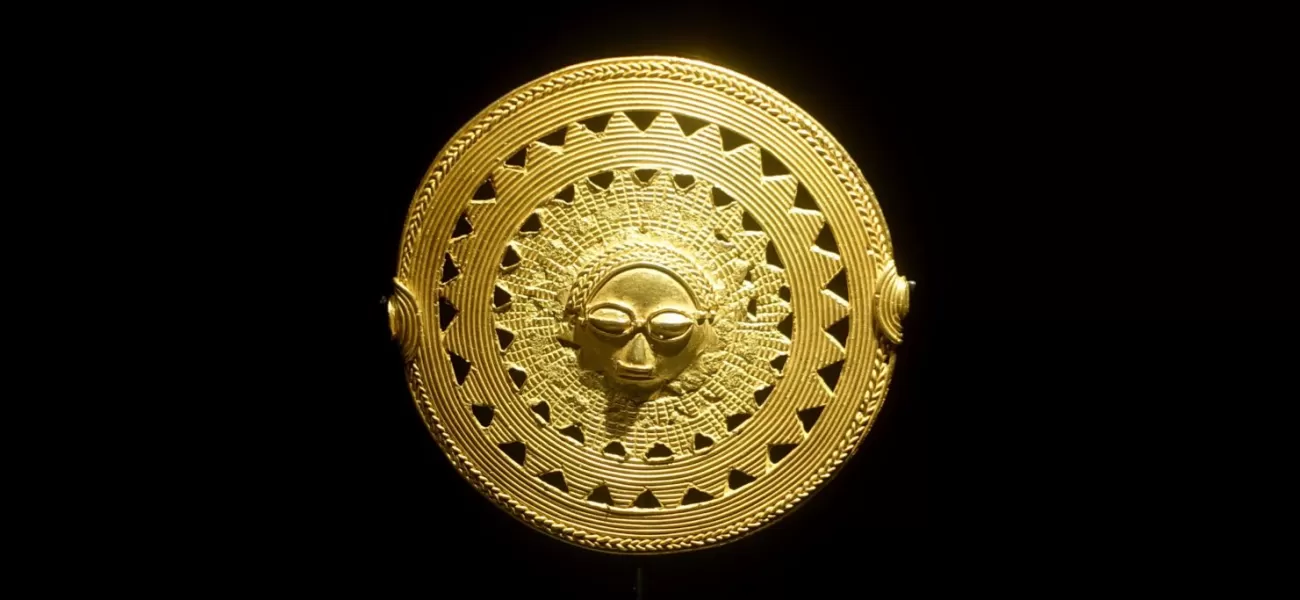After 150 years, Ghana's Asante Kingdom recovers stolen artifacts.
After 150 years, Ghana's Asante kingdom has reclaimed seven stolen royal artifacts from British colonial forces in a historic repatriation.
February 12th 2024.

In a momentous event, seven royal relics that were taken from Ghana's ancient Asante kingdom 150 years ago by British colonial forces have finally been returned and formally presented to the kingdom. This marks a significant milestone in the ongoing efforts to address the plundering of African cultural heritage, as reported by the Associated Press. The artifacts, which include an elephant tail whisk, an elaborate wooden, leather, and iron chair, two gold stool ornaments, a gold necklace, and two bracelets, were stolen during British colonization and later housed at the Fowler Museum at the University of California, Los Angeles.
The presentation ceremony held in Kumasi, Ghana's largest city, was filled with emotion as Otumfuo Osei Tutu, the king of the Asante kingdom, spoke about the historical significance of the occasion. He expressed, "We are here...the white man came into Asanteman to loot and destroy it." The return of these cultural treasures has brought great joy and relief to the Asante kingdom, putting an end to a long-standing battle for repatriation.
The artifacts were taken in 1874 during the looting of the Asante city and were considered part of the kingdom's indemnity payment to the British. Their return on the 150th anniversary of their plundering signifies a symbolic restoration of Ghana's cultural soul. Kwasi Ampene, one of the negotiators in the repatriation process, emphasized the significance of this, stating, "The repatriation of these artifacts to Ghana means the return of our souls."
The Fowler Museum, where the artifacts were previously housed, has made it clear that all seven items are being returned unconditionally and permanently, although replicas have been allowed. This aligns with a global shift in the perspective of museums, recognizing them as ethical custodians rather than unquestionable owners and interpreters of art solely based on scholarly expertise.
Silvia Forni, the director of the Fowler Museum, highlighted this evolving perspective, saying, "We are globally moving away from the idea of museums as unquestionable repositories of art, and towards the idea of museums as custodians with ethical responsibility to preserve cultural heritage."
For the Asante people, these returned artifacts hold more than just cultural value; they are symbols of prestige and reverence for their ruler. Samuel Opoku Acheampong, a staff member at the Asante palace, reflected on the cultural significance, stating, "Our forefathers and fathers told us about these artifacts, and since I was a child, I have always had the vision that one day we shall have all of them back in our Asante nation."
This repatriation is a part of a larger movement advocating for the return of stolen artifacts to their countries of origin, signaling a shift towards a more ethical and inclusive approach to preserving cultural heritage. This movement also aligns with recent news that rapper Ja Rule plans to build a school in Ghana, showing a growing recognition and connection to the African continent. The return of these artifacts is a powerful step towards reclaiming and honoring the rich history and culture of Ghana's ancient Asante kingdom.
The presentation ceremony held in Kumasi, Ghana's largest city, was filled with emotion as Otumfuo Osei Tutu, the king of the Asante kingdom, spoke about the historical significance of the occasion. He expressed, "We are here...the white man came into Asanteman to loot and destroy it." The return of these cultural treasures has brought great joy and relief to the Asante kingdom, putting an end to a long-standing battle for repatriation.
The artifacts were taken in 1874 during the looting of the Asante city and were considered part of the kingdom's indemnity payment to the British. Their return on the 150th anniversary of their plundering signifies a symbolic restoration of Ghana's cultural soul. Kwasi Ampene, one of the negotiators in the repatriation process, emphasized the significance of this, stating, "The repatriation of these artifacts to Ghana means the return of our souls."
The Fowler Museum, where the artifacts were previously housed, has made it clear that all seven items are being returned unconditionally and permanently, although replicas have been allowed. This aligns with a global shift in the perspective of museums, recognizing them as ethical custodians rather than unquestionable owners and interpreters of art solely based on scholarly expertise.
Silvia Forni, the director of the Fowler Museum, highlighted this evolving perspective, saying, "We are globally moving away from the idea of museums as unquestionable repositories of art, and towards the idea of museums as custodians with ethical responsibility to preserve cultural heritage."
For the Asante people, these returned artifacts hold more than just cultural value; they are symbols of prestige and reverence for their ruler. Samuel Opoku Acheampong, a staff member at the Asante palace, reflected on the cultural significance, stating, "Our forefathers and fathers told us about these artifacts, and since I was a child, I have always had the vision that one day we shall have all of them back in our Asante nation."
This repatriation is a part of a larger movement advocating for the return of stolen artifacts to their countries of origin, signaling a shift towards a more ethical and inclusive approach to preserving cultural heritage. This movement also aligns with recent news that rapper Ja Rule plans to build a school in Ghana, showing a growing recognition and connection to the African continent. The return of these artifacts is a powerful step towards reclaiming and honoring the rich history and culture of Ghana's ancient Asante kingdom.
[This article has been trending online recently and has been generated with AI. Your feed is customized.]
[Generative AI is experimental.]
0
0
Submit Comment





